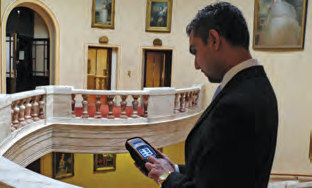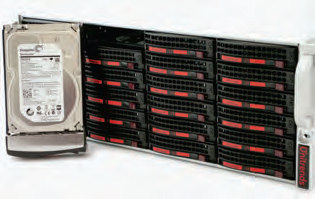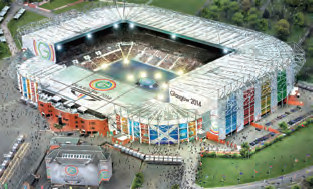30 June 2014

Free Wi-Fi – the ‘killer app’ for hotel guests
Even when we’re enjoying our leisure time or taking a well-earned break, we all still expect constant connectivity from hotels, sports venues and entertainment service providers.
Free Wi-Fi – the ‘killer app’ for hotel guests
GLH runs 36 hotels in the UK and its brands include Amba, Clermont, Guoman and Thistle. The company also claims to be the largest hotel owner-operator in London with five luxury properties such as The Royal Horseguards, Charing Cross and The Cumberland.
GLH believes that quick and reliable Wi-Fi connectivity is essential for its guests, and cites research which says this is now a decisive feature when it comes to choosing a hotel. As a result, the company has upgraded its wireless network across its hotels which now offer free, fast and unlimited Wi-Fi in all bedrooms, lobby areas and meeting rooms. It’s available to all guests and visitors and there’s no need to register to gain access.
The company is working with BT which manages the network and is now the telco’s biggest user of free Wi-Fi.
GLH had already done some network upgrades for the 2012 Olympics but knew that offering free Wi-Fi across all its UK hotels would require higher performance and greater increases in capacity.
Previously, the hotels were running Cisco access points (APs) that supported 2.4GHz and these were upgraded to Cisco’s Aironet 1042 802.11n dual band APs that also offer 2.5GHz. On top of that, the internet backhaul was also upgraded using gigabit circuits and Cisco’s Catalyst 2960 Series PoE switches together with Cat6 cabling from Connectix. Around 2,900 APs, including Cisco’s latest Aironet 3702 Series that support 802.11ac, have since been deployed as part of an ongoing network upgrade to gigabit capacity.
GLH says that providing free and easily available Wi-Fi access to all guests and visitors has not led to any issues with network congestion. It says that thanks to gigabit capacity, the network is nowhere near reaching its capacity.
More significantly, the company works with BT to proactively monitor network usage at each of its hotels. It can identify where and when traffic spikes occur, and which of its thousands of APs are seeing the most throughput. Staff at each hotel, such the manager at The Royal Horseguards (below left), have been trained to monitor the networks daily using Fluke’s AirCheck meters. These can instantly show network performance indicators such as the signal strength of each AP, and therefore provide real evidence that can be presented to BT. Any negative feedback from users about the Wi-Fi is instantly acted upon.
GLH is now working with the telco to implement separate SSIDs to cover its back office systems. For example, later this year it plans to run housekeeping apps over the network that allow staff to centrally report when rooms have been cleaned and are ready for their next occupants.

Film storage
Film storage
With more than two million subscribers, LoveFilm claims to be the leading online DVD rental and streaming service in the UK and Europe. Following a series of mergers, its infrastructure needed an upgrade. In 2011, the firm was bought by Amazon and the IT team then began integrating all the disparate IT solutions.
Their first step was to virtualise and this was completed in 2012. LoveFilm now has more than a hundred virtual servers, several vSQL databases, and eight physical servers. Most of the infrastructure is based in two data centres with a disaster recovery (DR) site located at a remote site. The existing backup system had evolved with a variety of solutions but had become harder to manage and more expensive.
LoveFilm’s IT infrastructure analyst Paul Houghton says the company had already looked at a virtual system but discovered it was unable to protect the physical servers. The solution came in the shape of Unitrends’ Recovery-943 appliance (below) and Enterprise Backup software. This created the platform LoveFilm needed to protect both its virtual and physical infrastructure.
The ’943 is said to be the industry’s first tiered storage high-density enterprise class backup appliance with 36TB drives configured in a RAID-60 to optimise redundancy and performance. Unitrends says it is specifically designed to allow parallel commit of metadata and backup streams. It was installed at LoveFilm’s primary data centre in London’s Docklands to underpin its IT environment and SAN. Enterprise Backup was deployed to a VM at the DR site in Islington, giving the company 40TB of backup capacity.
Unitrends says the system was up and running in less than four weeks despite LoveFilm expecting it to take three months to complete. It has since proven to be easy to use. On the occasions when LoveFilm has suffered issues with VMs and its SAN,the restore has been quick and simple. Unitrends says its appliances’ ability to take snapshots and protect virtual servers once a day is a valuable feature, as is the capability to backup incremental changes to the vSQL machines on an hourly basis.

Boston connects Glasgow
Boston connects Glasgow
Boston Networks is the official cabling services integrator for the Glasgow 2014 Commonwealth Games that are due to open on 23 July.
The locally based firm is responsible for the design and deployment of a multifaceted cabling infrastructure, enabling the delivery of various technology services throughout all the venues being used for the games. These include Celtic Park (pictured above), the SSE Hydro, the athletes village, the organisers’ HQ based in Glasgow’s Merchant City, and others.
Boston says its aim is to create a “truly resilient” solution using best of breed technology and expert design. It’s estimated that the ongoing deployment will involve the installation of more than 3,000 outlets and over 100km of fibre and cabling which includes products supplied by Brand-Rex. Boston says the highly scalable, structured and fibre optic solution will support voice, data and video comms. The critical infrastructure will be used by event officials, athletes, press and broadcasters, as well as a range of other operational personnel for the duration of the games.
In addition to the Glasgow 2014 organising committee, Boston has worked with a wide range of key stakeholders who will also heavily rely on the various cabling systems. They include: the technology systems integrator; official timekeeper; large video display contractor; host broadcaster, and the venue overlay contractors.
As part of its remit, the company will also deliver support from the Technology Operations Centre with the establishment of a dedicated service desk to fully manage the operational integrity of the solution. It says this will guarantee the prompt resolution of any incidents and provide centralised monitoring across all venues.
Key competition and non-competition venues will also require dedicated onsite support, during and leading up to the operational period of each site. Boston says it will manage fully qualified venue support teams as well as roaming support personnel to ensure “omnipresent” help and maintenance services. All the cabling for the games is being installed on a temporary basis. It will be removed after the event and recycled in accordance with industry standards, although Boston says that individual venues may be able retain any cabling should they wish to do so.
-(002).png?lu=245)







